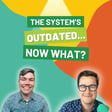
Step Aside, Superman! This Isn’t About You
Sometimes helping doesn’t help.
In this episode, we’re unpacking saviourism... the kind that sneaks in when we want to do good, but end up taking up space that wasn’t ours to begin with. We explore how it differs from real, respectful allyship and what it looks like to support inclusion without stepping into the spotlight.
Saviourism can be hard to spot in ourselves. It often shows up wrapped in good intentions: speaking on behalf of someone instead of making room for their voice, leading change without listening first, or rushing in to fix things that need a bit more time to develop.
It’s not about having perfect answers, but it is about noticing the impact of what we do, even when the intention is good. This episode is an invitation to reflect, recalibrate and keep showing up in ways that don’t take over.
__________
We want your feedback! Got some ideas about how we can improve the podcast?! We’ve made a short, painless survey to find out what you think, what you want more of... and what topics you'd love to hear us cover next. Let us know your thoughts here
___________
Want to get in touch? Contact us at podcast@transfocus.ca
Join us on social media: LinkedIn | Instagram | TikTok | Threads | Facebook



















